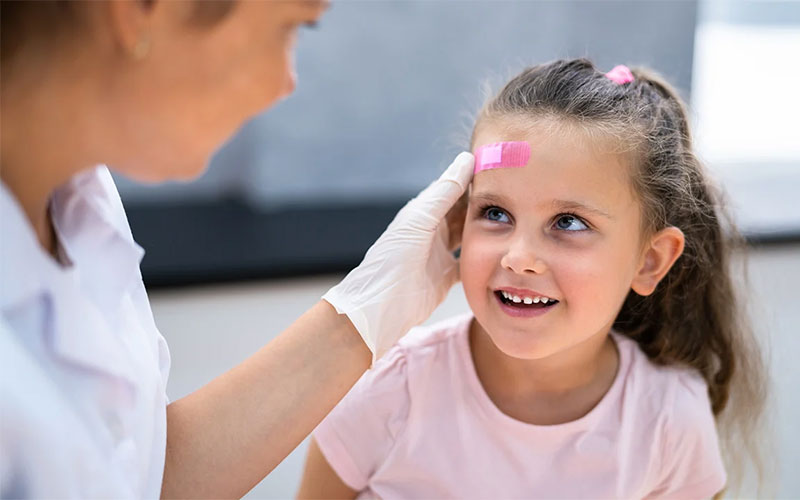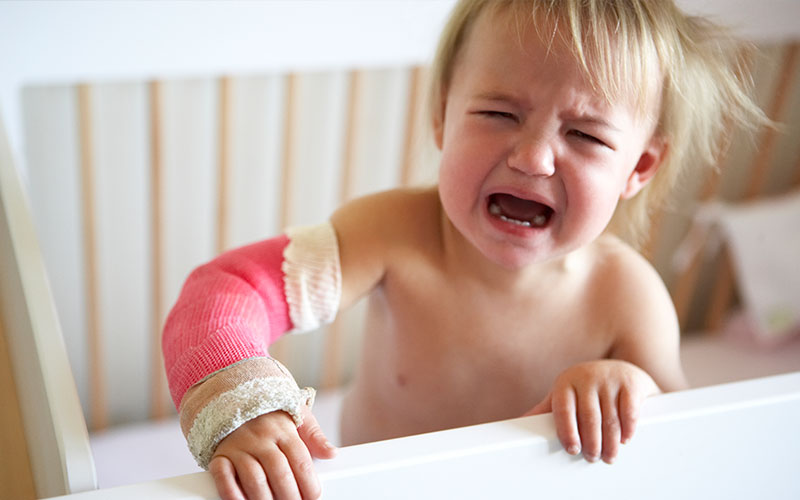Introduction
Welcoming a new baby into the family is a joyous occasion, but it also comes with the responsibility of ensuring their safety. From the moment they come into this world, babies are curious explorers, making it crucial for parents and caregivers to create a safe environment. Here’s a comprehensive guide on how to protect your little one from injuries at every stage of their development.

Safe Sleep
Ensuring your baby gets a good night’s sleep is essential for their growth and development. Create a safe sleep environment by placing them on their back on a firm mattress with no loose bedding or toys nearby. Use a sleep sack instead of blankets to keep them warm and avoid overheating.
Babyproofing
Babies are curious and love to explore their surroundings, which means every corner of your home should be babyproofed. Install safety gates at the top and bottom of stairs, cover electrical outlets, and secure furniture to the wall to prevent tipping accidents.
Car Safety
Traveling with a baby requires extra precautions to keep them safe on the road. Always use a rear-facing car seat in the back seat until they outgrow it, and never leave them unattended in the car, even for a minute.
Bath Time Safety
Bath time can be a fun bonding experience, but it’s essential to prioritize safety. Always test the water temperature before placing your baby in the tub, and never leave them alone, even for a moment. Keep all bath supplies within arm’s reach and never leave water in the tub when bath time is over.
Feeding Safety
Whether breastfeeding or bottle-feeding, it’s crucial to prioritize safety during feeding time. Ensure that your baby is positioned correctly to prevent choking, and never prop up their bottle. When introducing solid foods, start with soft, mashed foods and supervise them closely to prevent choking hazards.
Toy Safety
Toys play a vital role in your baby’s development, but not all toys are safe. Choose toys that are age-appropriate, free from small parts that could pose a choking hazard, and made from non-toxic materials. Regularly inspect toys for signs of wear and tear, and discard any broken or damaged toys immediately.
First Aid Basics
Despite your best efforts, accidents can still happen. Knowing basic first aid can help you respond quickly and effectively in case of minor injuries. Keep a first aid kit stocked with essentials like bandages, antiseptic wipes, and infant pain relievers, and familiarize yourself with CPR and choking rescue techniques.
Baby Gear Safety
From strollers to cribs, baby gear is designed to keep your little one safe and comfortable. Always follow the manufacturer’s instructions when assembling and using baby gear, and regularly check for recalls to ensure that your equipment is up to date.
Outdoor Safety
Exploring the great outdoors is a wonderful way to bond with your baby, but it’s essential to prioritize safety. Use sunscreen to protect their delicate skin from the sun’s harmful rays, dress them in lightweight clothing to prevent overheating, and never leave them unattended, especially near water.
Choking Hazards
Choking is a leading cause of injury and death in young children, making it crucial to be vigilant about potential choking hazards. Keep small objects like coins, buttons, and batteries out of reach, cut food into small, bite-sized pieces, and learn how to perform infant choking rescue techniques.
Recognizing Signs
Despite your best efforts, accidents can still happen, so it’s essential to know when to seek help. If your baby experiences a serious injury or shows signs of distress such as difficulty breathing or loss of consciousness, seek medical attention immediately.
Conclusion
Keeping your baby safe from injuries requires diligence, vigilance, and a commitment to creating a safe environment at home and beyond. By following the tips outlined in this guide, you can help protect your little one as they explore the world around them.
Internal links : https://mrbabar.online/digital-wellness-navigating-the-challenges-of-screen-time-and-tech-addiction/
External links :
Early education is foundational in shaping the future of babies, fostering essential developmental skills that serve as a platform for lifelong learning. From birth, babies engage in a remarkable process of brain development, where secure relationships with caregivers play a vital role. These early interactions influence everything from emotional well-being to intellectual growth, paving the way for future academic success and social competence.
Incorporating elements like cultural awareness and multilingualism in early education broadens a child’s horizons and enhances cognitive abilities, boosting problem-solving skills and emotional intelligence. Moreover, providing a mix of sensory experiences—such as outdoor learning—can stimulate creativity and environmental awareness, giving babies a well-rounded start in life
WOHM | Changing Children’s Lives
For a deeper understanding of early education’s impact on future success, these external resources offer valuable insights:
- Benefits of Early Childhood Education & Effects on Future SuccessWOHM | Changing Children’s Lives
- The Role of Caring Relationships in Early Brain DevelopmentNAEYC
